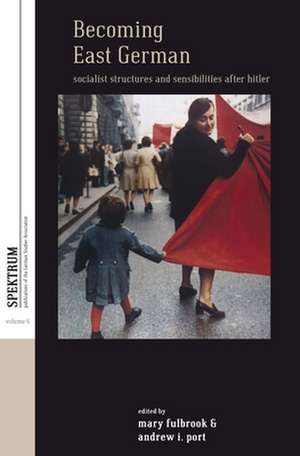Becoming East German: Spektrum: Publications of the German Studies
Editat de Mary Fulbrook, Andrew I. Porten Limba Engleză Hardback – 12 sep 2013
Mary Fulbrook, FBA, is Professor of German History at University College London. Her most recent books are A Small Town near Auschwitz: Ordinary Nazis and the Holocaust (2012) and Dissonant Lives: Generations and Violence through the German Dictatorships (2011). She is currently directing an AHRC-funded collaborative project on Reverberations of War in Germany and Europe: Communities of Experience and Identification since 1945. A former Chair of the German History Society, and Chair of the Modern History Section of the British Academy, she has written widely on the GDR.
Andrew I. Port is an Associate Professor of history at Wayne State University in Detroit, and Review Editor of the German Studies Review. His research focuses on modern Germany, communism and state socialism, labor history, social protest, and comparative genocide. His first book, Conflict and Stability in the German Democratic Republic (2007), appeared in German translation as Die Rätselhafte Stabilität der DDR (2010), and his current project looks at German reactions to genocide in other parts of the world since 1945.
Preț: 752.00 lei
Preț vechi: 976.63 lei
-23% Nou
Puncte Express: 1128
Preț estimativ în valută:
143.91€ • 156.27$ • 120.89£
143.91€ • 156.27$ • 120.89£
Carte tipărită la comandă
Livrare economică 23 aprilie-07 mai
Preluare comenzi: 021 569.72.76
Specificații
ISBN-13: 9780857459749
ISBN-10: 0857459740
Pagini: 314
Dimensiuni: 152 x 229 x 19 mm
Greutate: 0.59 kg
Editura: BERGHAHN BOOKS INC
Seria Spektrum: Publications of the German Studies
ISBN-10: 0857459740
Pagini: 314
Dimensiuni: 152 x 229 x 19 mm
Greutate: 0.59 kg
Editura: BERGHAHN BOOKS INC
Seria Spektrum: Publications of the German Studies
Notă biografică
Mary Fulbrook, FBA, is Professor of German History at University College London. Her most recent books are A Small Town near Auschwitz: Ordinary Nazis and the Holocaust (2012) and Dissonant Lives: Generations and Violence through the German Dictatorships (2011). She is currently directing an AHRC-funded collaborative project on Reverberations of War in Germany and Europe: Communities of Experience and Identification since 1945. A former Chair of the German History Society, and Chair of the Modern History Section of the British Academy, she has written widely on the GDR. Andrew I. Port is an Associate Professor of history at Wayne State University in Detroit, and Review Editor of the German Studies Review. His research focuses on modern Germany, communism and state socialism, labor history, social protest, and comparative genocide. His first book, Conflict and Stability in the German Democratic Republic (2007), appeared in German translation as Die Ratselhafte Stabilitat der DDR (2010), and his current project looks at German reactions to genocide in other parts of the world since 1945.
Cuprins
List of Abbreviations Preface Introduction: The Banalities of East German Historiography Andrew Port Part I: Memory and Identity after Nazism Chapter 1. East Germans in a Post-Nazi State: Communities of Experience, Connection, and Identification Mary Fulbrook Chapter 2. Divisive Unity: The Politics of Cultural Nationalism during the First German Writers' Congress of October 1947 Andreas Agocs Chapter 3. Communicating History: The Archived Letters and Memories of "The Red Orchestra" Joanne Sayner Chapter 4. Remembered Change and Changes of Remembrance: East German Narratives of Antifascist Conversion Christiane Wienand Part II: Health, Food, and Embodied Citizens Chapter 5. Perceptions of Health after World War II: Heart Disease and Risk Factors in East and West Germany, 1945-75 Jeannette Madarasz Chapter 6. Socialism Fights the Proletarian Disease: East German Efforts to Overcome Tuberculosis in a Cold War Context Donna Harsch Chapter 7. The Slim Imperative: Discourses and Cultures of Dieting in the German Democratic Republic, 1949-1990 Neula Kerr-Boyle Chapter 8. Luxury Dining in the Later Years of the German Democratic Republic Paul Freedman Part III: Constraints and Conformity: Friends, Foes, and Disciplinary Practices Chapter 9. Expectations, Predispositions, and the Paradox of Working-Class Behavior in Nazi Germany and the German Democratic Republic Andrew Port Chapter 10. Israel as Friend and Foe: Shaping East German Society through Freund- and Feindbilder David Tompkins Chapter 11. Humiliation as a Weapon within the Party: Fictional and Personal Accounts Phil Leask Chapter 12. Playing the Game: Football and Everyday Life in the Honecker Era Alan McDougall Afterword: Structures and Subjectivities in GDR History Mary Fulbrook List of Contributors
Recenzii
"This is an excellent edited collection. It provides a range of methodological approaches and is right up to date: it introduces a number of new academics onto the scene while also providing some old favourites. The volume significantly adds to our understanding of East Germany and its population. It provides a reassessment of antifascism and memory... Port's introduction and Fulbrook's chapter on memory are masterful." * Mark Fenemore, Manchester Metropolitan University "By focusing less on politics in the narrower sense of the word, and more on changing discourses on the one hand and the agency of ordinary East Germans on the other, the volume provides us with exciting and innovative new sources and results as well as important questions for future research." * Dorothee Wierling, Forschungsstelle fur Zeitgeschichte, Hamburg
